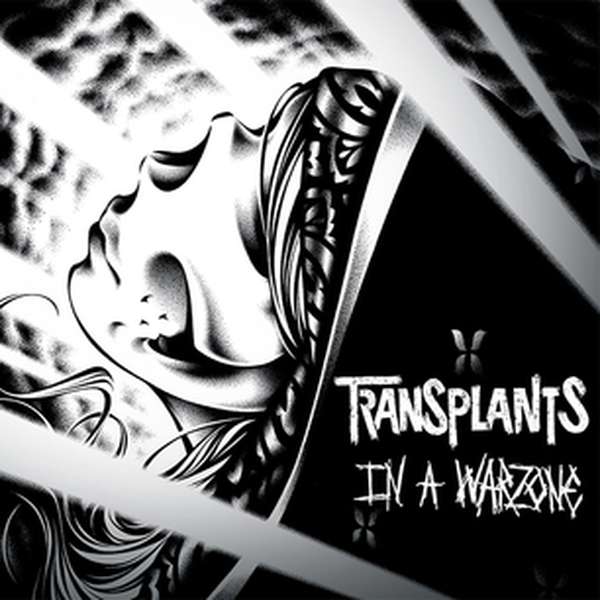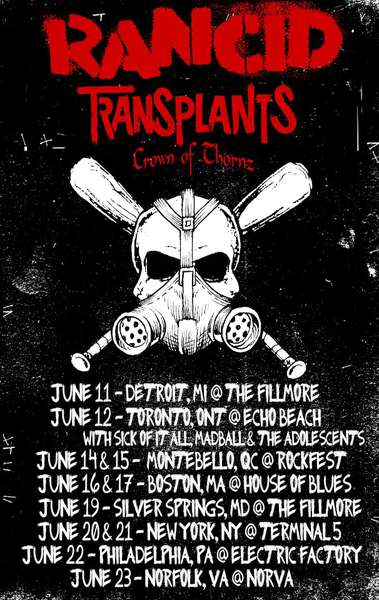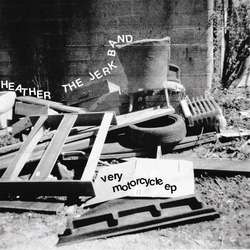I grew up on Rancid and they introduced me, eventually, to a much wider world of punk rock than what I caught on late night Headbangers Ball and 120 Minutes episodes. Or, for those who didn’t get where this is going from that intro sentence: I feel that I have to qualify why I’m listening to In a Warzone, the third record from The Transplants. The Transplants are a side project “supergroup” comprised of Tim Armstrong (Rancid), Rob Aston (Death March), and Travis Barker (Blink 182). Additional instruments and verses come from guest appearances.
In many ways, the most interesting thing about the Transplants is that they exist at all. While Armstrong and Barker at first seemed an odd pairing, the oddest part has proven to be their musical creation. Taking a firm basis in punk rock, the group exists as an outlet for the musicians to let convention fly and to play around with songwriting, genre be damned. They blend a number of styles, but have moved more and more toward a punk/hip-hop hybrid as they’ve developed. In a Warzone continues that path while bringing punk rock, namely d-beat, back to the fore. Thematically it explores the concept of, you got it, warzones, and gritty punk is a fine aural complement to that subject. The theme itself is murky beyond the tone: it’s grim, violent, and abrasive, but lyrically it’s devoid of much insight other than a general distrust of authority figures and politicians and a lot of references to crumbling infrastructure.
It starts out with the promising title track and burns through four blazing punk songs before it quickly falls apart with “Something Different.” Featuring Bun B on anything that I just called a punk record is, indeed, something different. I’ll give them some points for that, but the song is just plain dumb. After reading press that said they threw their previous “party record” mentality aside for this, all the progress from the record’s start is lost here when B declares “I need a new drug/ a Huey Lewis.” The record starts to get its footing back with some more blazing and chorus-defined singalongs and then comes “It’s a Problem.”
This track features Paul Wall and, while his delivery is probably the highlight of an otherwise repetitive and boring song, I haven’t needed a new song about sipping syrup since 2006. That and, again, the cohesion of the album is lost and the tone of wartime despair is replaced suddenly by a song about codeine. Why? This would be fine as a single, but it just doesn’t fit.
The overall record has a more cohesive feel than its two predecessors because of the more unified focus in theme and style. The band was created to push boundaries and they don’t do that quite as much, but it does lend itself to a better listening experience over the run of a dozen tracks because it’s not all over the map. The downside of that is it makes the mis-steps more glaring. The more punk-fused style is also better suited to Alston’s lyrical flow, as his rapping has always had its cringe-worthy moments on the first two releases, and it makes me at least a little more curious about his work with Death March. Songs like “Any of Them,” “Back to You,” and “Gravestones and Burial Plots” are pretty solid, singalong punk, reminiscent of the harder-edged Rancid songs from throughout their career (namely post-2000) and it’s worth a listen. However, their catalog thus far has been largely a one-and-done listening experience, more to check out the hybrid concoction than to seriously enjoy it. Some tracks would hit well on a mixtape but the repeat value of The Transplants remains to be seen. The punker songs are an improvement, but they still suffer from repetitive choruses. The Transplants have made strides, but it still has that side project, unfocused feel than lessens the overall appeal of the record. Fans of the last two Rancid records should enjoy this, but I’m not sure who else.





